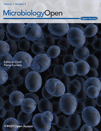
MicrobiologyOpen
Scope & Guideline
Unlocking the frontiers of microbiology through open access.
Introduction
Aims and Scopes
- Microbial Ecology and Diversity:
Research exploring the diversity of microbial communities in various environments, including aquatic, terrestrial, and host-associated ecosystems, and their functional roles. - Pathogenesis and Host Interactions:
Studies examining the mechanisms of microbial pathogenesis, virulence factors, and interactions between pathogens and host immune responses. - Microbial Biotechnology:
Investigations into the application of microorganisms in biotechnology, including genetic engineering, metabolic pathways, and the use of microbes in industrial processes. - Antimicrobial Resistance:
Research focused on the mechanisms of antimicrobial resistance in bacteria, the spread of resistance genes, and the implications for public health. - Microbial Genomics and Metagenomics:
Utilization of genomic technologies to study microbial genomes and metagenomic approaches to analyze complex microbial communities. - Food and Environmental Microbiology:
Research addressing the role of microorganisms in food safety, spoilage, and production, as well as their impact on environmental health.
Trending and Emerging
- Microbiome Research:
There is an increasing focus on the human and animal microbiomes, particularly their roles in health, disease, and nutrition, suggesting a growing interest in personalized medicine and microbiome manipulation. - Environmental Microbiology and Bioremediation:
Research addressing the role of microbes in environmental processes, including bioremediation and ecosystem health, is gaining importance as environmental concerns rise. - Viral Interactions and Viromics:
The study of viral communities, particularly those associated with microbial hosts (viromes), is emerging as a significant area of interest, reflecting a broader understanding of microbial ecology. - Antimicrobial Resistance Mechanisms:
Investigations into the genetic and biochemical mechanisms underlying antimicrobial resistance are increasingly prominent, driven by the global health crisis of resistant pathogens. - Synthetic Biology and Genetic Engineering:
There is a marked trend towards utilizing synthetic biology approaches for engineering microbial strains, which has implications for biotechnology and medicine.
Declining or Waning
- Plant-Microbe Interactions:
Although still relevant, the number of studies specifically focused on interactions between plants and their associated microbial communities has decreased, suggesting a shift towards more general ecological studies. - Traditional Antibiotic Discovery:
Research on conventional antibiotic discovery appears to be less prevalent as the field moves towards exploring alternative therapies, such as bacteriophage therapy and antimicrobial peptides. - Basic Microbial Physiology:
There is a noticeable reduction in publications centered solely on fundamental aspects of microbial physiology, possibly due to a growing emphasis on applied microbiology and biotechnological applications.
Similar Journals
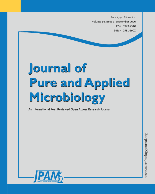
Journal of Pure and Applied Microbiology
Advancing Microbial Knowledge for a Sustainable FutureJournal of Pure and Applied Microbiology, published by DR M N KHAN, is an esteemed Open Access journal that has been dedicated to advancing the frontiers of microbiological research since its inception in 2007. Located in Bhopal, Madhya Pradesh, India, this journal presents a platform for researchers and professionals in the fields of Applied Microbiology and Biotechnology, offering insights that span a diverse range of topics critical to both scientific progress and industrial applications. As of 2023, the journal is categorized in the Q3 and Q4 quartiles, demonstrating its relevance and growing impact within the community—ranking #219 in Biochemistry, Genetics and Molecular Biology and #93 in Immunology and Microbiology. With an emphasis on accessibility, the journal has embraced an Open Access format since 2017, allowing for a wider dissemination of knowledge. By publishing high-quality research, the Journal of Pure and Applied Microbiology plays a pivotal role in fostering innovation and collaboration among researchers, students, and industry professionals alike.

WORLD JOURNAL OF MICROBIOLOGY & BIOTECHNOLOGY
Transforming Science Through Microbiology and BiotechnologyWORLD JOURNAL OF MICROBIOLOGY & BIOTECHNOLOGY, published by Springer, serves as a pivotal forum for advancing the fields of microbiology and biotechnology since its inception in 1990. Located in the Netherlands, this esteemed journal has secured a prominent position in the academic landscape, recognized for its strong impact factor and prestigious Q2 category rankings across disciplines such as Applied Microbiology, Biotechnology, and Physiological Sciences. Researchers and professionals utilize this journal to disseminate innovative findings and explore emerging technologies that are transforming the scientific landscape. With a robust submission rate and high visibility among the academic community, the journal fosters interdisciplinary collaboration, encouraging discussions that bridge gaps between theory and practical applications. As it converges into 2024, the WORLD JOURNAL OF MICROBIOLOGY & BIOTECHNOLOGY continues to be a vital resource for scholars aiming to enhance our understanding of microbial processes and biotechnological advances.

ANTONIE VAN LEEUWENHOEK INTERNATIONAL JOURNAL OF GENERAL AND MOLECULAR MICROBIOLOGY
Unveiling the Complexities of Microbial InteractionsANTONIE VAN LEEUWENHOEK INTERNATIONAL JOURNAL OF GENERAL AND MOLECULAR MICROBIOLOGY, published by Springer, is a vital resource for advancing research in the fields of microbiology and molecular biology. With its ISSN 0003-6072 and E-ISSN 1572-9699, this journal consistently focuses on cutting-edge studies and developments, providing a platform for the dissemination of knowledge that spans over its rich history from 1934 onwards. The journal holds an impressive reputation, ranked Q2 in Medicine (miscellaneous) and Q3 in both Microbiology and Molecular Biology for 2023, reflecting its significant contribution to the scientific community. Researchers and professionals from various disciplines rely on this journal for quality publications that address complex microbial interactions and molecular mechanisms. Although it currently does not provide open access options, its compelling research remains accessible through institutional subscriptions, allowing it to foster collaborative advancements in the ever-evolving landscape of microbiological sciences.
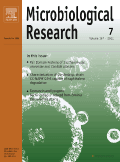
MICROBIOLOGICAL RESEARCH
Transforming Microbiology Through Rigorous ResearchMICROBIOLOGICAL RESEARCH, published by Elsevier GmbH, serves as a leading platform for advancements in the field of Microbiology, holding an impressive Q1 ranking in its category as of 2023. With an ISSN of 0944-5013 and E-ISSN 1618-0623, this journal has been instrumental in disseminating high-quality research since its inception in 1994 and continues to contribute significantly to the academic landscape through 2024. Positioned within the top 13% of publications in the Immunology and Microbiology category, ranked #24 out of 182 according to Scopus, it attracts the attention of researchers, professionals, and students alike. While the journal is not open access, it offers vital insights and peer-reviewed articles that drive innovation and exploration within microbiological research. Its rigorous selection process underscores the importance of quality and relevance in advancing knowledge in this dynamic field.

ARCHIVES OF MICROBIOLOGY
Advancing the Frontiers of Microbial ScienceThe Archives of Microbiology, published by Springer, is a reputable journal in the field of microbiology, serving as a vital platform for the dissemination of groundbreaking research and critical reviews since its inception in 1974. With an ISSN of 0302-8933 and an E-ISSN of 1432-072X, this journal operates out of Germany and maintains a global reach, promoting high-quality scholarship across multiple disciplines, including biochemistry, genetics, and molecular biology, as evidenced by its Q2 ranking in Medicine (miscellaneous) and consistent Q3 placements in other categories in 2023. Although the journal does not offer open access options, its rigorous peer-review process ensures that published articles are of the highest standard, making it an essential resource for researchers, professionals, and students keen on advancing their understanding of microbial sciences. As the journal converges toward 2024, it remains committed to fostering innovative microbiological research and facilitating interdisciplinary dialogue within the scientific community.

JOURNAL OF MICROBIOLOGY AND BIOTECHNOLOGY
Leading the Charge in Microbial DiscoveriesJOURNAL OF MICROBIOLOGY AND BIOTECHNOLOGY, published by the Korean Society for Microbiology and Biotechnology, is a premier academic journal based in South Korea that has been at the forefront of advancing knowledge in the fields of microbiology, biotechnology, and their applied sciences since its inception in 1991. This journal holds a commendable Q2 quartile ranking in key categories, including Applied Microbiology and Biotechnology, showcasing its significant impact within the academic community. With an emphasis on high-quality, peer-reviewed research, the journal aims to disseminate innovative findings that foster deeper understanding and advancements in microbial and biotechnological sciences. Researchers, professionals, and students utilize this journal to stay informed about contemporary developments and to inspire future investigations. Although it is not an open-access journal, its content is accessible through various academic libraries and databases, providing a vital resource for those engaged in cutting-edge research.
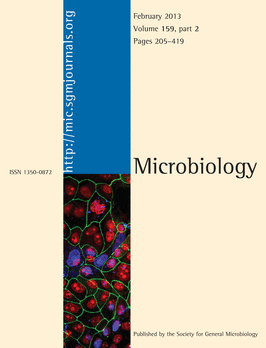
MICROBIOLOGY-SGM
Elevating research standards in microbiology, one article at a time.MICROBIOLOGY-SGM, published by the esteemed MICROBIOLOGY SOC in the United Kingdom, is a pioneering journal dedicated to advancing the field of microbiology. With its ISSN 1350-0872 and E-ISSN 1465-2080, the journal serves as a vital platform for researchers, professionals, and students to disseminate significant findings and engage in the latest developments in microbiology. Since its inception in 1994, MICROBIOLOGY-SGM has upheld rigorous academic standards, demonstrated by its position in the Q2 quartile of the 2023 Scopus category for Microbiology, ranking #108 out of 182. While traditionally not an open-access journal, it offers a rich selection of articles that address a variety of topics within the microbiological sciences. As we approach 2024, the journal continues to foster collaboration and knowledge exchange, making it an indispensable resource for those at the forefront of microbiological research.
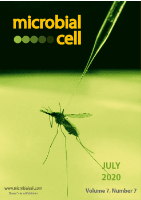
Microbial Cell
Empowering knowledge sharing in the microbial sciences.Microbial Cell is a distinguished open-access journal published by SHARED SCIENCE PUBLISHERS OG, focusing on the dynamic fields of microbiology, biochemistry, and molecular biology. Since its establishment in 2014, Microbial Cell has been at the forefront of disseminating cutting-edge research essential for advancing our understanding of microbial functions and interactions. With a commendable impact factor and ranking in the top quartiles (Q1 and Q2) across several categories, including Applied Microbiology and Biotechnology and Parasitology, this journal serves as an invaluable resource for researchers, professionals, and students alike. It features a comprehensive scope that encompasses the latest findings in genetics, cell biology, and virology, facilitating the academic community's access to high-quality peer-reviewed work. Microbial Cell not only contributes to advancing microbial sciences but also fosters an inclusive platform for knowledge sharing and collaboration in the scientific community.

Microorganisms
Innovating discoveries in microbiology and virology.Microorganisms is a leading open-access journal published by MDPI based in Switzerland, catering specifically to the rapidly evolving fields of microbiology and virology. Since its inception in 2013, the journal aims to foster the dissemination of high-quality research through its comprehensive and interdisciplinary platform, with a particular focus on both fundamental and applied microbiological sciences. Contributing to its esteemed reputation, Microorganisms holds a commendable Q2 ranking in the categories of Microbiology and Virology, as well as in Medical Microbiology, highlighting its significance in the academic community. With a consistent impact, evidenced by its rankings in Scopus—such as rank #25 in Virology and #56 in Microbiology—the journal serves as an invaluable resource for researchers, professionals, and students looking to stay at the forefront of microbiological research. As an open-access journal, Microorganisms ensures that vital research findings are readily available to a global audience, promoting collaboration and innovation in the study of microbial life and its implications for health and disease.

MICROBIOLOGY
Transforming Microbiological Insights into Real-World SolutionsMICROBIOLOGY (ISSN: 0026-2617, E-ISSN: 1608-3237), published by MAIK NAUKA/INTERPERIODICA/SPRINGER, is a pivotal journal in the field of microbiological research, operating from the vibrant hub of New York, United States. With a focus on the intricate relationships and functionalities of microorganisms, MICROBIOLOGY serves as an essential resource for professionals and researchers dedicated to advancing the knowledge of applied microbiology and biotechnology. As of 2023, it holds a competitive Q3 and Q4 category ranking in Applied Microbiology and Biotechnology and Microbiology, respectively, reflecting its commitment to high-quality and impactful research. Although currently not open access, the journal extends comprehensive insights into critical topics that span environmental microbiology, clinical applications, and biotechnology advancements, making it a vital platform for disseminating innovative findings in this ever-evolving discipline. Researchers and students alike will find MICROBIOLOGY to be an invaluable addition to their academic and professional repertoire.